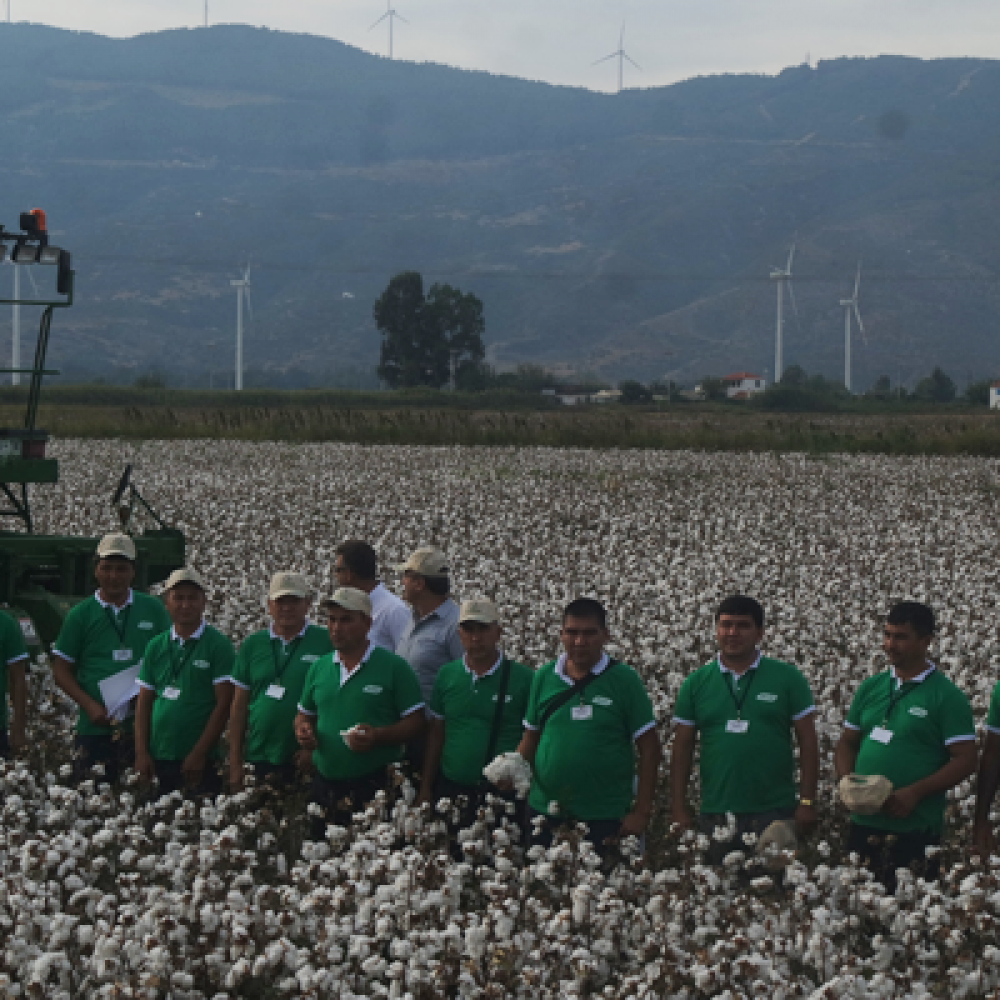Planning of Training Center of the Ministry of Agriculture of Uzbekistan
Product Code :
CATEGORY : PROJECTS
Subcategory : Facility, Investment and Consultancy Projects
The Education Center Planning Project of the Ministry of Agriculture of Uzbekistan is an impressive initiative that aims to make value-added agricultural productions by putting cotton production at the center in Uzbekistan and to meet the qualified personnel needs of dozens of cluster structures made up of foreign investors. Within the scope of the project, Technology Supported Agricultural Training Centers are planned, aiming to increase the quality of life of farmers by increasing their productivity and profitability with technology and qualified knowledge in agriculture.
In this direction, analyzes of the agricultural situation and training needs in the designated regions of Uzbekistan were carried out, and local experts were included in training programs in Turkey, and trainings were organized in cooperation with Konya Food and Agriculture University. The success of the project manifested itself by conveying the experiences of exemplary farmers and companies in the fields of production and harvesting techniques, cooperatives and planned production, and being a source of inspiration for many countries.
What is the problem?
Low value-added agricultural production: The prevalence of cotton production-oriented agriculture in Uzbekistan has led to the production of low value-added agricultural products.
Lack of qualified personnel: There is a need for qualified personnel for the development of agricultural clusters consisting of foreign investors.
Migration and unemployment: Due to the productivity and low income in agricultural production, young people living in rural areas migrate to cities and unemployment is a problem.
Lack of digitization: The use of digital technologies and the lack of digital infrastructure in villages limit agricultural productivity and marketing opportunities.
Use of new technologies in the agricultural sector: There is a lack of knowledge and reservations of farmers about the use and application of innovative agricultural technologies.
Lack of education and information: Farmers have limited access to adequate training and information on efficient and sustainable farming techniques.
Agricultural sustainability: Soil and water pollution caused by improper spraying and fertilization threatens agricultural sustainability.
Social, Economic and Environmental Impact of the Problem
Social Impacts:
- Agricultural labor productivity decreases due to low value-added agricultural production and lack of qualified personnel, which negatively affects the income level of farmers.
- Migration and unemployment problems may cause separation in their families and society as rural youth tend to work in cities, and the quality of life in villages may decrease with the decrease in rural population.
Economic Impacts:
- Low value-added agricultural production reduces agricultural incomes and negatively affects economic growth.
- The low agricultural productivity may affect the foreign trade balance by increasing the country's foreign dependency on agricultural products.
Environmental Effects:
- Soil and water pollution caused by applications such as wrong spraying and fertilization creates negative effects on the environment and ecosystems and threatens sustainable agriculture.
Naturally, Our Solution Strategy
Qualified Training Programs: Training programs covering the knowledge and skills needed by the personnel who will work in the agricultural sector will be planned and implemented.
Technology and Innovation: The use of modern agricultural technologies and innovative methods will be encouraged to increase productivity in agricultural production.
Expert Collaboration: Agricultural needs and training requirements in the regions where the project will be implemented will be determined by collaborating with local experts and training contents will be created accordingly.
Farmer Participation: By ensuring the active participation of farmers in training programs, trainings will be provided according to their needs, and they will be supported to become more conscious and productive in agricultural practices.
Social Support and Awareness: Social support and awareness activities will be carried out to encourage young people to work in the agricultural sector, to prevent migration and to improve rural life.
Environmental Awareness: With the awareness of nature and environmental protection, it is aimed to spread sustainable and environmentally friendly practices in agricultural production.
Cooperation and Partnership: It is aimed to ensure the success of the project by establishing cooperation and partnership with all stakeholders such as international companies, universities, local governments, NGOs and farmers.
The Difference of Our Solution Strategy
- Our solution strategy aims to increase productivity by adopting a technology and information-oriented approach in agricultural production.
- The project prioritizes creating a sustainable agriculture model, taking into account the environmental and social benefits.
- By adopting the culture of cooperation and partnership, Tabit brings together different stakeholders and offers an inclusive approach that covers various layers of society.
Our Soldier
- With this project, we aim to transform traditional farming methods with contemporary technologies.
- We aim to provide positive change in the countryside by aiming to improve the production and living conditions of small family farmers.
- We aim to increase productivity and quality and support environmental sustainability by increasing access to information, education and technology in the agricultural sector.
Tabit's work
- Agricultural situation and training needs analysis was conducted in the designated regions of Uzbekistan.
- Local experts were included in the training program in Turkey for the planned trainings.
- Trainings on agricultural technologies were organized in cooperation with Konya Food and Agriculture University.
- In the Smart Village, examples of innovative methods and harvesting techniques in agricultural production were presented.
- With the example of Konya Şeker, information was shared on cooperatives and planned production.
- Participants from abroad were given training on agriculture, animal husbandry and integrated food facilities.
- Informative activities were carried out to ensure that farmers reach economic prosperity by using the right methods.
- Trainings were organized covering all topics from production and harvesting techniques to successful examples of cooperatives.
Dissemination studies
- The successful results of the project and the applied trainings were introduced on platforms such as international agricultural technology fairs and conferences.
- The success story and effects of the project were published through news and articles through media outlets.
- The project was shared with other countries through international agricultural organizations and stakeholders, and inspired similar studies to be carried out.
Economic Sustainability
Investor Relations: The project was implemented with the contributions of foreign investors. The financial resources of the project were secured by establishing long-term cooperation with the investors.
Training Programs: Training programs organized within the scope of the Ministry of Agriculture Training Center planning were financed by receiving a certain fee from the participants. These fees contributed to meeting the operational expenses of the training center.
Collaborations and Sponsorships: The project was carried out in cooperation with local and international institutions and was supported by sponsorships and donations. Thanks to these collaborations, the sustainability of the project was strengthened by increasing economic resources.
Project SDG Impacts
SDG 1 - End Poverty: It is aimed to improve the economic situation of farmers by increasing productivity in agricultural production and encouraging value-added production.
SDG 2 - End Hunger: The project aims to increase agricultural products by increasing agricultural productivity and value-added production.
SDG 4 - Quality Education: The Ministry of Agriculture's Training Center contributes to the development of agricultural knowledge and skills by providing agricultural trainings to farmers.
SDG 8 - Decent Work and Economic Growth: The project aims to increase employment opportunities by promoting the use of new technologies in the agricultural sector and increasing value-added production.
SDG 9 - Industry, Innovation and Infrastructure: It is aimed to strengthen the infrastructure in the agricultural sector by using agricultural technology and innovations.
SDG 12 - Sustainable Consumption and Production: The project supports sustainable consumption and production by aiming to be sensitive to the environment and natural resources in agricultural production.
SDG 17 - Strengthening with Partnerships: The project aims to establish and strengthen partnerships in the field of sustainable agriculture, supported by international cooperation and investor relations.




